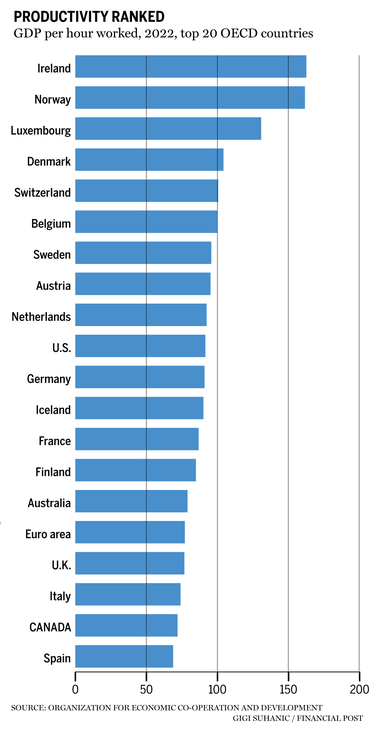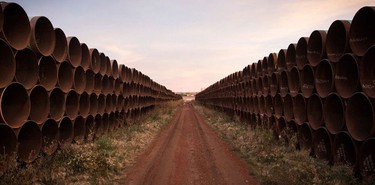Most of us in all probability do not perceive or care concerning the poor productiveness that economists and politicians are nervous about, however we must always. Joe O’Connor seems to be at learn how to remedy this Canadian disaster — and why it issues
Article content material
Frances Donald was both having a extremely productive morning or a disastrous end to her workweek, relying upon one’s definition of disasters in relation to getting stuff achieved.
Royal Financial institution of Canada’s chief economist dropped off her child at daycare and was all the way down to work earlier than 8 a.m. on June 6, which was not fairly a “Tremendous Bowl” magnitude day for economists, she stated, however extra alongside the traces of the “playoffs,” since Statistics Canada was about to launch its labour power survey for Could and that’s the sort of factor economists get fired up about.
Article content material
Article content material
Commercial 2
Article content material
The unexpected twist got here shortly earlier than 9 a.m., when the daycare referred to as to say she wanted to choose up her youngster due to an upset tummy. Typically pulling off the work/life juggle simply doesn’t go in keeping with plan. As Donald’s morning proved, nevertheless, most Canadians aren’t a bunch of lazybones kicking again on the sofa watching Netflix all day, however a bunch of grinders onerous at work and at life.
Article content material
But that doesn’t jibe with Canada’s well-known points with productiveness, particularly in comparison with the US and different international locations. That flagging productiveness over the previous couple of many years has added one other layer of angst for policymakers, economists and others who take into consideration this nation’s future and learn how to make it higher.
“Whilst a mainstream economist, I’m shifting away from merely pulling aside the statistics as a result of for those who simply take a look at the statistics, you’re not seeing the entire image,” Donald stated. “The query is, how can we create an revolutionary, scalable, resilient financial system?”
It’s a nice query, underscored with a fair better urgency than ever to reply since some, similar to Financial institution of Canada’s senior deputy governor Carolyn Rogers in March 2024, have stated Canada is within the grips of a productiveness “emergency,” not a time period central bankers throw round calmly.
Article content material
Equally mind-blowing, maybe, is to study that Canada throughout its centennial yr in 1967 was thought-about the world’s third-most affluent nation, behind solely the US and Switzerland.
Elevated productiveness is a win. It’s a present that retains giving
Philip Cross, the previous chief financial analyst at Statistics Canada
World productiveness rankings weren’t a factor again in these days, however Canada right now is 18th finest, sandwiched between Italy and Spain — the nation that made taking a day nap well-known — whereas Eire is tops, begging the query: what within the title of James Joyce has been occurring round right here?
“Most individuals don’t perceive and possibly couldn’t care about productiveness, however there’s a really shut hyperlink between your productiveness and your revenue,” Philip Cross, the previous chief financial analyst at Statistics Canada, stated.
Productiveness, he stated, boils all the way down to how briskly you are able to do your work and do it appropriately. The quicker the work will get achieved — precisely — the extra time there’s to do different issues similar to hanging out with pals, volunteering or caring for enterprise at residence.
Transformed into {dollars} and cents, productiveness measures the quantity of output per hour labored. Forty years in the past, Canadians generated 88 per cent of the worth of Individuals per hour labored, however that dropped to 71 per cent by 2022.
That’s one thing all Canadians ought to care about since Individuals generate US$91.50 per capita per hour labored versus US$71.90 for these north of the border. In different phrases, labour productiveness isn’t an summary statistic, however the basic financial measure of a rustic’s prosperity.
Article content material
“Elevated productiveness is a win,” Cross stated. “It’s a present that retains giving.”
A extra productive Canada could be residence to locals flush with extra money and the means to purchase higher vehicles, homes and different issues, nevertheless it might additionally present higher roads, hospitals, public colleges and transit, and provides the nation a greater probability of retaining its homegrown expertise, which is vital to sustaining future productiveness.

Working smarter
“If you discuss productiveness, too many Canadians suppose, ‘Does that imply I’m purported to work more durable, as a result of I’m already working as onerous as I can and I’m juggling my household and I’m teaching the minor hockey workforce,’ and so forth,” John Manley, the one-time deputy prime minister and present chair of funding banking agency Jeffries Canada, stated. “Productiveness isn’t about working more durable; it’s about working smarter.”
Manley is 75, however views retirement as a quaint relic of the twentieth century and desires the identical had been true for Canada’s productiveness disaster. It’s a topic he first publicly addressed in a 1999 speech on the Empire of Canada Membership in Toronto.
In case there have been any skeptics within the Bay Road crowd that day, he identified Ontario was about as productive as “Mississippi”; per capita revenue within the U.S. on the time was 30 per cent greater than in Canada, and this nation had the bottom fee of productiveness progress among the many G7 in the course of the previous 25 years.
Article content material

Time has marched on, however occasions haven’t modified with regards to the productiveness challenges bedevilling the nation. These embody, in no explicit order, inside commerce boundaries, companies sitting on their wallets as a substitute of constructing capital investments, matching immigrants to jobs that use their abilities, authorities purple tape, an absence of entry to capital, prosperity-killing company tax insurance policies, an absence of competitors in sure components of the financial system, not sufficient innovation and never sufficient willpower to do something to unravel the issue.
One of many trickiest mountains to climb, Manley stated, is that Canada isn’t an entire productiveness catastrophe and continues to be a comparatively affluent nation.
“Canadians are inclined to have this angle of for those who don’t have to repair one thing as a result of it’s onerous to repair, then why would you repair it?” he stated.
However Manley is aware of firsthand Canadians are greater than able to making robust fixes. Within the Nineteen Nineties, a Wall Road Journal headline proclaimed that Canada was an “honorary member of the Third World.” The nation’s credit standing had been downgraded, the debt was ticking previous half a trillion {dollars} and 34 cents of each tax greenback collected was going towards servicing the debt.
Article content material
It was an existential fiscal disaster, and Jean Chrétien’s authorities wanted to take drastic motion, not essentially as a result of they liked the concept of constructing change, however as a result of the nation not had a selection.
Again in these days, Manley was business minister. He oversaw a division that in the reduction of to 9 applications from 54 and laid off 25 per cent of its employees. Switch funds to the provinces had been slashed. It was an unsightly time, he stated, however by February 1998, the federal government delivered Canada’s first balanced price range in 30 years.
Disaster solved. The ethical of the story? Change is troublesome, however it isn’t unattainable.
Altering attitudes
Among the many modifications that at the moment should be made is a widespread shift in opinion about extractive industries similar to oil and fuel, mining and forestry.
“We typically don’t wish to admit it, however it’s our pure sources that pay the payments in Canada,” Manley stated. “We shouldn’t be ashamed of that.”
However the productiveness challenges confronting the power sector, for instance, are way more complicated than most individuals in city centres suppose.
As soon as upon a time within the oilpatch, Scott Saxberg, the founder and former chief government of Crescent Level Vitality Corp., now referred to as Veren Inc., stated there was loads of investor capital to go round.
Article content material
Canada was the place to be when he initially received into the sport within the early 2000s. He didn’t know any of the “guidelines,” however what he discovered was a regulatory atmosphere that, yr over yr, grew more and more dense. There all the time appeared to be a brand new regulation being layered on high of an outdated regulation and that introduced on elevated uncertainty. Traders, he stated, hate uncertainty.
The Individuals delaying and finally quashing the Keystone XL pipeline was one other blow, and the bruises finally started so as to add up.
Saxberg remembers assembly a possible investor in Scotland and feeling assured about reaching a deal proper up till the gentleman appeared down at his telephone, appeared again up and stated he was not going to speculate as a result of it appeared Keystone XL was not going to fly. With out the brand new pipeline, any power firm producing in Canada could be at a “value drawback in comparison with producers within the U.S.” Finish of assembly.
Article content material

“Capital is aggressive; it strikes across the globe,” he stated. “So whenever you hear the phrase competitiveness, what meaning is you wish to create a rustic with an atmosphere that pulls capital and out competes different international locations for that capital as a result of capital seems to be at an business on a macro foundation and it goes, ‘Effectively, you’re not going to be a superb long-term funding, so we’re going to look elsewhere.’”
Article content material
Alberta’s oilsands had the added drawback of being a extra pricey product to supply, in addition to being subsequent door to the U.S., which underwent a fracking craze and accomplished 5 new pipelines in 2024 alone, in keeping with the U.S. Vitality Info Administration.
In the meantime, a number of worldwide gamers, together with TotalEnergies SE, BP PLC, ConocoPhillips and Shell PLC, have exited the province in recent times.
Wooing them again, Saxberg stated, goes to require streamlining laws, rising capability to maneuver oil and pure fuel to market (hey pipelines) and a recognition that Alberta and Saskatchewan will not be the unhealthy guys, however key drivers of Canadian prosperity.
The federal government-owned Trans Mountain Pipeline is a poster youngster of productiveness. It requires about 750 individuals to function, provides Canadian oil producers higher entry to abroad markets and is anticipated to supply $2.8 billion in tax revenues by 2043.
“That pipeline produces a product that goes into worldwide markets and the cash comes again to Canada and we put it into well being care, schooling, roads, bridges, tunnels and no matter else,” Manley stated. “Think about what we might do with extra of the above.”
Article content material
Manufacturing positivity
Dreaming of a future full of recent pipelines can steal consideration away from among the extra upbeat and unsung productiveness tales within the current day. If Canada had been to nominate a chief storyteller to convey these yarns, Linda Hasenfratz, chair of auto-parts manufacturing large Linamar Corp., ought to get the nod.
She’s the kind of one who can take a look at a “drop of water in a glass and see it as half full,” one one who is aware of her properly stated.
Hasenfratz can be the kind of government who makes use of charts and graphs to hammer residence factors throughout an interview. Topping her checklist of key takeaways is that Linamar has boosted its productiveness by 100 per cent over the previous 15 years.
Over the identical timeframe, the Canadian manufacturing sector as a complete improved its productiveness by about 50 per cent, which, maybe surprisingly, outpaced the U.S. sector’s features.
Linamar has 75 crops worldwide and ranks its Canadian ones as its most efficient. Toyota Motor Corp.’s Canadian crops are its finest performers, in keeping with auto business analyst J.D. Energy, and Basic Motors Co.’s facility in Oshawa, Ont., constantly ranks as its high manufacturing facility in North America.
In different phrases, Canadian operations are competing and seem like crushing it.
Article content material
Article content material

However one impediment to that dynamic exhibiting up on Canada’s backside line is authorities, Hasenfratz stated. Almost one per cent of all Canadians are federal staff. Between 2010 and 2023, the federal government’s headcount grew by 26 per cent. Greater than 2.5 million Canadians labored for not-for-profit organizations in 2023, in keeping with authorities statistics.
Mixed, Hasenfratz stated meaning far too many well-educated Canadians are working in areas that don’t make a dime.
“We have to get extra individuals into revenue-generating companies and that might have an infinite constructive affect on productiveness,” she stated.
Hasenfratz additionally identified that the tales we select to inform about ourselves matter.
“If you hear issues like Canada isn’t productive, that isn’t very inspiring, and it doesn’t make you suppose, ‘Rattling, I’m going to get in there and be extra productive tomorrow,’” she stated. “However for those who see an instance of an organization that has doubled its productiveness over the previous 15 years and in doing so has gained enterprise, grown revenue and realized an amazing return on funding, then you definately’ll be like, ‘I wish to do this,’ as a result of that’s inspiring.”
Actuality examine
Trevor Tombe, a College of Calgary economics professor, acknowledges Canada is awash with unrealized potential, however stated there are points in making an attempt to understand these features.
Article content material
Let’s think about Hasenfratz and her manufacturing sector friends, oil producers and agriculturists are all capable of generate extra of what the world needs for export — particularly to locations apart from the U.S. All that stuff would want to get loaded into large container ships on the ports of Vancouver, Montreal and Halifax.
However the Port of Vancouver is already the biggest on the North American West Coast and is dealing with document ranges of cargo. An growth that has been within the works since 2013 won’t be accomplished till someday within the 2030s. Montreal received the ball rolling on its port growth in 2018, nevertheless it’s nonetheless in progress and an extended methods away.
“If you wish to promote a superb to a different nation past the US, you aren’t doing it by truck or rail; you’re doing it by port as a result of there’s an ocean in the way in which,” Tombe stated. “Proper now, we don’t have any extra port capability that might enable us to commerce way more with different international locations, and when it comes to a building timeline in Vancouver, it’s plausibly 20 years from begin to end.”
If Canada is unable to get its items shifting, diversify its commerce companions, develop exports to China, Japan, South Korea, India and so forth, the U.S. is left as the one choice. That isn’t an amazing place to be in when negotiating a brand new commerce cope with Donald Trump.
Article content material
Article content material

One choice is to construct ports elsewhere, similar to the Arctic. There at the moment isn’t a deepwater port to talk of there, however there’s been loads of discuss of constructing one — some day.
“There isn’t just financial and productiveness implications of unhealthy federal coverage round infrastructure, however nationwide safety implications,” Tombe stated.
One other space in want of a makeover that doesn’t require something extra difficult and time-consuming than enjoying round with some accounting software program datasets is tax coverage.
Small companies, outlined as firms with lower than 500 staff, make use of nearly 50 per cent of the labour power. However they don’t make capital investments in equipment and tools on the identical ranges as Canada’s G7 friends, other than the Italians, who make investments even much less. A employee who lacks the newest instruments isn’t as productive because the employee who does.
Corporations that retool an meeting line, improve laptops and arm employees with best-in-class devices are capable of write off the expenditures over quite a few years, however that “delays the worth” of the tax deductions, Tombe stated.
Had been an organization capable of write off the brand new laptops in a single fell swoop on the time of buy, properly, now we might be speaking, he stated, and the dialog would result in an atmosphere the place firms are inspired to reinvest right now.
Article content material
“It’s a solution to lower company taxes on new funding whereas sustaining company taxes on firms as a complete, so it’s less expensive than simply dropping the company tax fee itself,” he stated.
Which will appear a simple factor to do, and the identical goes for one more productiveness repair that pertains to Canada’s secret weapon: immigrants.
Walid Hejazi, an economics professor on the College of Toronto’s Rotman College of Administration, meets quite a lot of them, and he stated the outdated joke concerning the backseat of a taxi being the most secure place to have a coronary heart assault nonetheless holds up, although the taxi-driving physician from overseas right now might be behind the wheel of an Uber.
Hejazi, by the college, works with a bunch of immigrant ladies who all have college levels from one other nation. They’re good, savvy and wanting to develop into productive new Canadians.
“Have you learnt what the No. 1 job these ladies get supplied is?” he stated. “Serving espresso at Tim Hortons.”
Rotman places the newcomers by a crash micro-business course. If efficiently accomplished, that earns them a micro-credential from the varsity, which hopefully catches the attention of a man-made intelligence employment screener and will get them a face-to-face interview with one other human.
Article content material
“The purpose right here is to match the ladies with jobs which are extra commensurate with their abilities,” he stated.
As for being in comparison with the U.S., he stated being neighbours has been a present. We share the identical language and customs, usually get alongside and discover it simple to do enterprise with each other to the extent that Canada’s ho-hum productiveness degree has not been a handicap.
However the place it begins to be an enormous drawback is when the U.S. closes for enterprise and Canadian firms are compelled to win market share overseas.
“It’s comparatively simple for a Canadian firm to do enterprise within the U.S., and it requires productiveness at a given degree,” he stated. “However to go to Europe and Asia and compete requires a a lot greater productiveness degree.”
Past the numbers
Canada could also be having a productiveness “emergency,” however its productiveness is bettering, simply at a slower fee than different international locations with comparable attributes. That’s partly why Frances Donald will get the urge to “vent” when she speaks about productiveness, since obsessing over the numbers can obscure a extra basic query: What sort of Canada do Canadians aspire to?
“You might conceive a plan that might mechanically enhance our productiveness quantity,” she stated. “Nevertheless it wouldn’t really make the Canadian financial system higher for many Canadians.”
Article content material
For instance, not all these productivity-sapping public-sector staff are directors pushing paper round. They’re additionally academics, cops, wildfire fighters and docs. Shut to twenty per cent of Canadians have already ticked previous age 65, and odds are {that a} care facility is of their future in some unspecified time in the future.
“If I informed you that we might quadruple the variety of high-productivity engineers, however we dramatically cut back the variety of docs and that might lead to greater productiveness statistics, then you definately would possibly hear Canadians say, ‘Might I please choose the health-care employees over the high-productivity engineer?’” Donald stated.
Economists have spent a decade highlighting Canada’s productiveness ills, from inside commerce boundaries to lowered funding within the pure useful resource sector to an inexpensive housing disaster that solely will get worse by the yr.
It’s a drumbeat of doom that may overshadow what Canada has, mainly, a extremely educated inhabitants, a large breadbasket of agricultural items, oil and fuel and demanding minerals galore and loads of room for the world’s finest and brightest who could also be eager to signal on.
“In Canada, we don’t should ask what we’re going to bake out of nothing as a result of we have already got an extended checklist of one thing,” Donald stated. “Our challenge is to have a collective understanding of what this nation has been blessed in, from issues within the floor to our extremely excessive degree of schooling — spanning from items to a blossoming companies sector. Canada isn’t quick on the substances to construct a robust financial system; the place we have now fallen quick is on the execution.”
• E-mail: joconnor@postmedia.com
Bookmark our web site and help our journalism: Don’t miss the enterprise information you have to know — add financialpost.com to your bookmarks and join our newsletters right here.
Article content material















